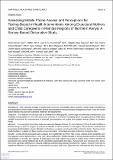Assessing Mobile Phone Access and Perceptions for Texting-Based mHealth Interventions Among Expectant Mothers and Child Caregivers in Remote Regions of Northern Kenya_A Survey-Based Descriptive Study
View/
Publication Date
2017-01-30Type
Article, Journalviews
downloads
Metadata
Show full item recordCitation
Kazi, A.M., Carmichael, J., Hapanna, G.W., Wangoo, P.G., Karanja, S., Wanyama, D., Muhula, S.O., Kyomuhangi, L.B., Loolpapit, M., Wangalwa, G.B., Kinagwi, K., & Lester, R.T. (2017). Assessing Mobile Phone Access and Perceptions for Texting-Based mHealth Interventions Among Expectant Mothers and Child Caregivers in Remote Regions of Northern Kenya: A Survey-Based Descriptive Study. JMIR Public Health and Surveillance, 3.
Abstract/
Background With a dramatic increase in mobile phone use in low- and middle-income countries, mobile health (mHealth) has great potential to connect health care services directly to participants enrolled and improve engagement of care. Rural and remote global settings may pose both significant challenges and opportunities. Objective The objective of our study was to understand the demographics, phone usage and ownership characteristics, and feasibility among patients in rural and remote areas of Kenya of having text messaging (short messaging service, SMS)-based mHealth intervention for improvements in antenatal care attendance and routine immunization among children in Northern Kenya. Methods A survey-based descriptive study was conducted between October 2014 and February 2015 at 8 health facilities in Northern Kenya as part of a program to scale up an mHealth service in rural and remote regions. The study was conducted at 6 government health facilities in Isiolo, Marsabit, and Samburu counties in remote and northern arid lands (NAL). Two less remote health facilities in Laikipia and Meru counties in more populated central highlands were included as comparison sites. Results A total of 284 participants were surveyed; 63.4% (180/284) were from NAL clinics, whereas 36.6% (104/284) were from adjacent central highland clinics. In the NAL, almost half (48.8%, 88/180) reported no formal education and 24.4% (44/180) self-identified as nomads. The majority of participants from both regions had access to mobile phone: 99.0% (103/104) of participants from central highlands and 82.1% (147/180) of participants from NAL. Among those who had access to a phone, there were significant differences in network challenges and technology literacy between the 2 regions. However, there was no significant difference in the proportion of participants from NAL and central highlands who indicated that they would like to receive a weekly SMS text message from their health care provider (90.0% vs 95.0%; P=.52). Overall, 92.0% (230/250) of participants who had access to a telephone said that they would like to receive a weekly SMS text message from their health care provider. Most phone users already spent the equivalent of 626 SMS text messages on mobile credit for personal use. Conclusions Despite the remoteness of northern Kenya’s NAL, the results indicate that the majority of pregnant women or care givers attending the maternal, newborn, and child health clinics have access to mobile phone and would like to receive text messages from their health care provider. mHealth programs, if designed appropriately for these settings, may be an innovative way for engaging women in care for improved maternal and newborn child health outcomes in order to achieve sustainable development goals.
Further Details
©Abdul Momin Kazi, Jason-Louis Carmichael, Galgallo Waqo Hapanna, Patrick Gikaria Wangoo, Sarah Karanja, Denis Wanyama, Samuel Opondo Muhula, Lennie Bazira Kyomuhangi, Mores Loolpapit, Gilbert Bwire Wangalwa, Koki Kinagwi, Richard Todd Lester. Originally published in JMIR Public Health and Surveillance (http://publichealth.jmir.org), 30.01.2017.
Publisher
PMC PebMed CentralCollections
- General - GEN [367]

